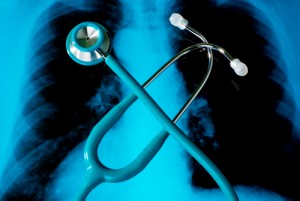 The University of Kentucky, the University of Louisville and the Lung Cancer Alliance recently renounced the launch of the Kentucky LEADS project (Lung Cancer. Education. Awareness. Detection. Survivorship) which aims to reduce the lung cancer incidence in the region. A $7 million grant from the Bristol-Myers Squibb Foundation’s Bridging Cancer Care initiative will fund the project.
The University of Kentucky, the University of Louisville and the Lung Cancer Alliance recently renounced the launch of the Kentucky LEADS project (Lung Cancer. Education. Awareness. Detection. Survivorship) which aims to reduce the lung cancer incidence in the region. A $7 million grant from the Bristol-Myers Squibb Foundation’s Bridging Cancer Care initiative will fund the project.
Lung cancer kills more Americans than breast cancer, prostate cancer, and colon cancer combined. Kentucky has more cases of lung cancer than any other state, and the mortality rate associated with the disease is almost 50 percent (higher than the national average itself). 3,500 lives per year are lost because of lung disease in Kentucky. The Kentucky LEADS Collaborative is the first project that brings together community interdisciplinary partners, lung cancer prevention, and experts to assess new approaches for identifying lung cancer earlier and, consequently, improving survival. Improving caregivers’ quality and lung cancer patients’ lives and their survival rates will be an important goal as well.
“As Kentucky leads the nation in lung cancer mortality rates, we must step up to be a leader in finding solutions toward preventing, curing and coping with this destructive disease,” said Kentucky Governor Steve Beshear. “I strongly support this collaborative, wide-ranging effort as it coincides with this administration’s KyHealthNow goals of reducing statewide cancer and smoking rates by 10 percent by 2019. By working together, we can and will find a way to diminish the burden of this crisis in Kentucky.”
[adrotate group=”3″]
Jamie Studts, PhD, associate professor of behavioral science at the University of Kentucky and director of the Kentucky LEADS Collaborative said: “Historically there’s not been a lot of research or effort put into lung cancer survivorship because, unfortunately, there hasn’t been much survivorship (…) This project is an effort across several domains to help providers, patients, caregivers and health care programs do the best job possible to achieve better care and increase lung cancer survivorship.”
One in every two patients with lung cancer will die within a year, and within five years of diagnosis, only 16 out of 100 patients will live. “The timing of diagnosis is critical. Patients diagnosed at Stage 1 have a 57 percent chance of achieving five-year survival. That drops to 4 percent when patients have a late-stage diagnosis. Early detection and treatment of lung cancer, combined with education and patient support, is key to increased survival for patients living with lung cancer,” said John Damonti, president of the Bristol-Myers Squibb Foundation.
Dr. Goetz Kloecker from the University of Louisville and Connie Sorrell of the Kentucky Cancer Program West will review the practice patterns, and every single factor affecting referral and treatment of the disease within Kentucky. “It is our goal to help primary care providers throughout Kentucky to identify people at high risk of lung cancer and be aware of the significant improvements in diagnosis and treatment of lung cancer. We will give providers evidence-based information that enables them and their patients to receive the best possible care. An important part of this is the detection of cancer at an early stage. Once the cancer is diagnosed it is important for patients to receive the most effective treatments in order to have the best chance of cure, survival and quality of life,” explained Kloecker.
Special survivorship programs will be developed to promote well-being for patients suffering from lung cancer and their caregivers. The program will include care combining acute and late or long-term effects of the illness and each treatment as well as mental health support. Rigorous screening programs can save lives, according to the experts. Prevention and early detection will be promoted because when it comes to lung cancer, the symptoms usually appear after the disease has spread. Hence, high-quality lung cancer screening is imperative.
Laurie Fenton Ambrose, Lung Cancer Alliance president & CEO said: “We are so thrilled and proud to be a partner in this unprecedented public health coalition intent on bringing heartfelt support and life-saving services to Kentucky citizens impacted by lung cancer. Such ‘can do’ attitude not only will lead to a first-ever coordinated plan of action to reduce lung cancer’s foot print in Kentucky – but will stimulate other states to follow in its shoes in the months ahead. It is truly a momentous time worth celebrating.”

